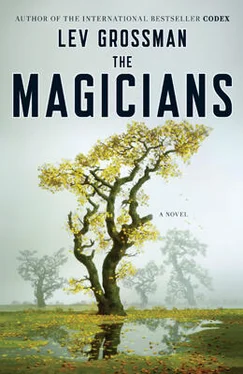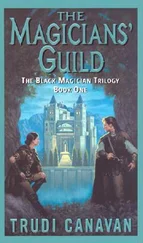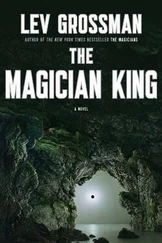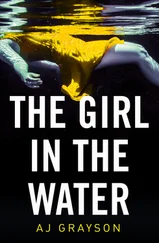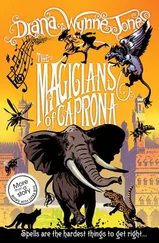He stared out the window. Fogg watched him impassively, just waiting for him to fall for it. If he cared one way or the other, he wasn’t letting on. The little floundering metal bird, having escaped its drawer, butted its head industriously against the wainscoting.
And then a vast stony weight suddenly lifted off Quentin’s chest. It felt like it had been there his entire life, an invisible albatross, a granite millstone holding him down, and all at once it just dropped away and disappeared without a splash. His chest expanded. He was going to bob up to the ceiling like a balloon. They were going to make him a magician, and all he had to do was sign. Jesus, what the hell was he thinking? Of course he was going to sign. This was everything he’d always wanted, the break he’d given up on years ago. It was right in front of him. He was finally on the other side, down the rabbit hole, through the looking glass. He was going to sign the papers and he was going to be a motherfucking magician. Or what the hell else was he going to do with his life?
“Okay,” Quentin said evenly. “All right. On one condition: I want to start now. I want to stay in that room. I don’t want to go home.”
They didn’t make him go home. Instead, his things arrived from home in a collection of duffel bags and rolly suitcases, packed by his parents, who had, as Fogg promised, somehow been squared with the idea that their only child was suddenly matriculating in the middle of the semester at a mysterious educational institution they had never visited or even heard of. Quentin slowly unpacked his clothes and his books and put them away in the cabinets and cubbies in the little curved tower room. He didn’t even want to touch them now. They were part of his old self, his old life, the one he was molting away. The only thing missing was the book, the notebook the paramedic gave him. That was nowhere to be found. He’d left it in the exam room on the assumption that he’d be going back there, but when he finally did it was gone. Dean Fogg and the butler pled ignorance.
Sitting there alone in his room, his folded clothes around him on the bed, he thought about James and Julia. God only knew what they were thinking. Did she miss him? Now that he was gone, would she realize she’d had the wrong man all along? He should probably get in touch with them somehow. Though really, what the hell could he say? He wondered what would have happened if James had taken the envelope from the paramedic too. Maybe he would have gotten to take the exam, too. Maybe that was part of the test.
He let himself unclench a little. Just slightly, he stopped bracing for the blow from above, and for the first time he seriously considered the idea that it might not come at all.
With nothing else to do Quentin roamed through the huge house, unsupervised and rudderless. The Dean and the teachers were nice enough when he ran into them, but they had their own work to do and their own problems to deal with. It was like being at a fancy beach resort during the off-season, rattling around in a grand hotel with no guests, just empty rooms and empty gardens and empty, echoing hallways. He ate his meals alone in his room and loitered in the library — naturally they had the complete works of Christopher Plover — and luxuriously contemplated, one by one, in order, each of the problem sets and projects and papers he would never have to finish. Once he found his way up to the clock tower and spent an afternoon watching the huge rusty iron pendulum sway back and forth, following the massive gears and levers and catchments as they turned and meshed, carrying out their mechanical syllogism, until the glow of the setting sun shone through the tremendous backward clock face.
Sometimes he burst out laughing out of nowhere, for no reason. He was experimenting cautiously with the idea of being happy, dipping an uncertain toe into those intoxicatingly carbonated waters. It wasn’t something he’d had much practice at. It was just too fucking funny. He was going to learn magic! He was either the greatest genius of all time or the biggest idiot. But at least he was actually curious about what was going to happen to him next. For the first time in he didn’t know how long he was actually following the action with interest. In Brooklyn reality had been empty and meaningless — whatever inferior stuff it was made of, meaning had refused to adhere to it. Brakebills was different. It mattered. Meaning — is that what magic was? — was everywhere here. The place was crawling with it. Out there he had been on the edge of serious depression, and worse, he had been in danger of learning to really dislike himself. He was on the verge of incurring the kind of inward damage you didn’t heal from, ever. But now he felt like Pinocchio, a wooden boy who was made real. Or maybe it was the other way around, he’d been turned from a real boy into something else? Either way the change was for the better. It wasn’t Fillory, but it would do.
He didn’t spend all his time alone. Once in a while he spotted Eliot from a distance, loping across the empty green or lolling with his long legs folded up in a window seat, staring out the window or leafing distractedly through a book. He had an air of magnificent melancholy sophistication, as if his proper place were elsewhere, somewhere infinitely more compelling even than Brakebills, and he’d been confined to his present setting by a grotesque divine oversight, which he tolerated with as much good humor as could be expected.
One day Quentin was walking the edge of the great lawn when he came across Eliot leaning against an oak tree, smoking a cigarette and reading a paperback book. It was more or less the same spot where they first met. Because of the odd way Eliot’s jaw was built, the cigarette stuck out at an angle.
“Want one?” Eliot asked politely. He stopped reading and held out a blue-and-white pack of Merit Ultra Lights. They hadn’t spoken since Quentin’s first day at Brakebills.
“They’re contraband,” he went on, not visibly disappointed that Quentin didn’t take one. “Chambers buys them for me. I once caught him in the wine cellar drinking a very good petite syrah from the Dean’s private collection. Stags’ Leap, the ninety-six. We came to an understanding. He’s really a nice fellow, I shouldn’t hold it over his head. Quite a good amateur painter, albeit in a sadly outdated realist mode. I let him paint me once — draped, thank you very much. I was holding a Frisbee. I think I was supposed to be Hyacinthus. Chambers is a pompiste at heart. Deep down I don’t think he believes Impressionism ever happened.”
Quentin had never met anybody so staggeringly and unapologetically affected. It was hard to know how to respond. He summoned up all the wisdom he’d accumulated during his entire life in Brooklyn.
“Merits are for pussies,” he said.
Eliot looked at him appraisingly.
“Very true. But they’re the only cigarette I can stand. Disgusting habit. Come on, smoke one with me.”
Quentin accepted the cigarette. He was in unfamiliar territory here. He’d handled cigarettes before — they were common props in close-up magic — but he’d never actually put one in his mouth. He made the cigarette vanish — a basic thumb palm — then snapped his fingers to bring it back.
“I said smoke it, not fondle it,” Eliot said curtly.
He muttered something under his breath, then snapped his own fingers. A lighter-size flame sprang into being over the tip of his index finger. Quentin leaned in and inhaled.
It felt like his lungs had been crumpled up and then incinerated. He coughed for five solid minutes without stopping. Eliot laughed so hard he had to sit down. Quentin’s face was slick with tears. He forced himself to take another drag and threw up into a hedge.
Читать дальше
